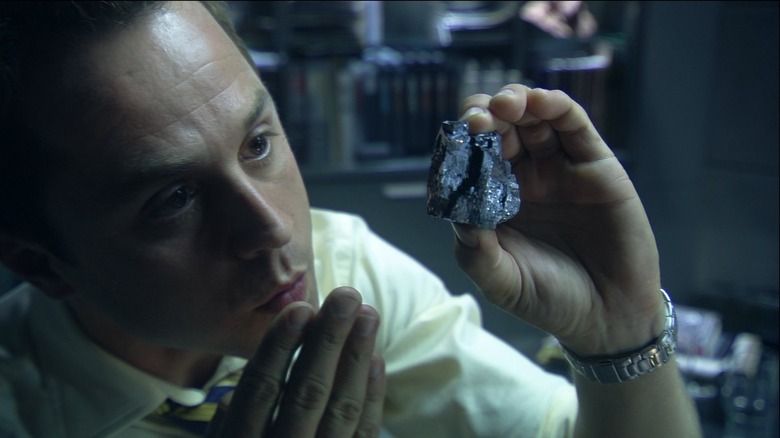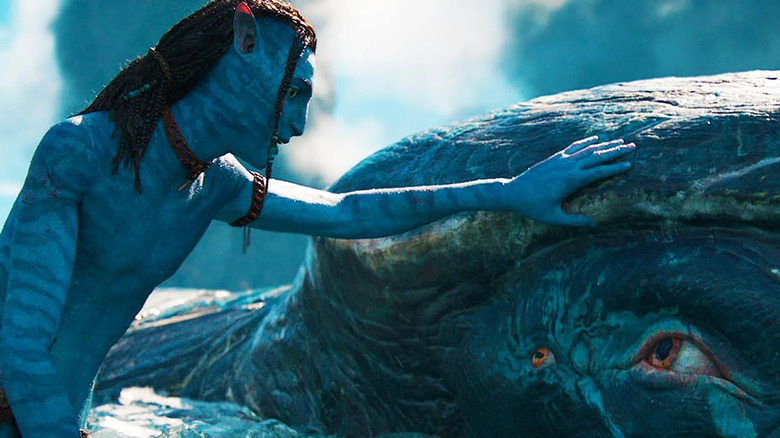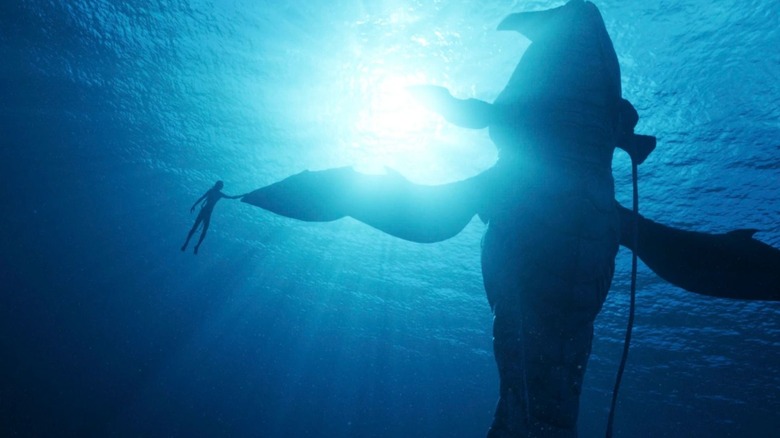Does Unobtanium Still Matter In Avatar: The Way Of Water?
This post contains spoilers for "Avatar: The Way of Water."
In James Cameron's 2009 film "Avatar," an evil corporate wonk appropriately named Parker Selfridge (Giovanni Ribisi) explains to Grace (Sigourney Weaver) that the distant planet of Pandora is a rich source of a rare mineral called unobtanium. The silly name was immediately tittered at by audiences, doubly so for people who had seen Jon Amiel's 2003 disaster film "The Core," which also featured a rare substance called unobtanium. Frustratingly, the actual makeup and function of this rare fictional ore was never explained. Selfridge definitely wanted it in great quantities, and was willing to commit genocide on the Pandora locals in order to get it, but audiences were never made privy as to why it was so coveted beyond its high monetary value.
Even more frustratingly, Selfridge has a line of dialogue later in the film explaining that the nearby deposit of unobtanium was the largest one ... for maybe 40 miles. It seems that if he had access to spacecraft, Selfridge could simply relocate to that next deposit.
Perhaps unobtanium's monetary value was meant to be the whole point of "Avatar" — genocide in exchange for gold — but that was never made explicit enough. Many filmgoers longed for a single line of dialogue that explained exactly what unobtanium was for. Was it a kind of starship fuel? Was it only used as jewelry for the rich? If unobtanium was used in a vital, life-saving medicine, "Avatar" would live in a much more interesting moral grey area.
As it stands, unobtanium may as well have been called McGuffium. It's a quick dialogue patch that almost sounds like a screenplay placeholder along the lines of [INSERT MOTIVATION HERE].
Alien whale brains
In the new sequel, "Avatar: The Way of Water," Selfridge only has one very, very brief scene, and on a video screen, no less. He explains to Col. Quaritch (Stephen Lang) that all his brain functions and memories had been uploaded into a computer chip, and then downloaded into a specially cloned Na'vi body. Quaritch will now have to live out his days in the body of a nine-foot space alien. His mission in "The Way of Water," however, has nothing to do with unobtanium. Indeed, it seems that unobtanium is pretty much no longer required by humans. It would have been nice to have a line of dialogue explaining that, perhaps, it had simply gone out of fashion on Earth, and that its value had plummeted. Something like that would have gone a long way to take the silliness curse off the rock.
Instead, Quaritch is on a mission, essentially, of revenge. Seeing as he was technically killed by the Na'vi in the first film, he seeks to capture and murder Jake Sully (Sam Worthington) for his crimes. While Quaritch and his Na'vi commandos scour the planet looking for Jake, our jarhead protagonist relocates to a faraway archipelago to hide out with a tribe of water-dwelling Na'vi.
The relocation allows James Cameron to indulge in some of the more impressive special effects to yet grace a movie screen. Navi characters swim freely with all manner of undersea fauna, and learn to ride on the backs of friendly plesiosaurs and flying ichthyosaurs. In one notable sequence, one of Jake's children befriends a psychic super whale. In so doing, the kid finds a metal spear stuck in the whale's fin.
There are whalers nearby. And they provide "Water" with its own unobtanium.
Tulkun brain drippings
Quaritch, in order to find Jake, has to team up with the local human whalers who have whale hunting down to a science. They also take a great deal of glee in killing the giant creatures. In a harrowing sequence, audiences witness a man named Mick (Brendan Cowell) climb into the mouth of a slain whale, point a drill up into the whale's brain, and sluck out a glass tube of viscous yellow brain humors.
Like unobtanium, this brain fluid is said to be very valuable. And then, in a moment that brings massive relief to audiences, the cerebral ambergris is actually explained. Mick says that a single vial fetches high prices because, back on Earth, it can be used in medical supplies that can stop aging.
Earlier in the film, Edie Falco's General Ardmore explains that Earth is dying out and that humans will have to relocate to Pandora. It seems that a terraforming effort is underway. Since Earth has access to a substance that causes their lifespans to increase, it stands to reason that they would be using up more and more of Earth's resources. If people cannot die, but continue to have children, overpopulation would be a massive problem pretty damn quickly.
A single line of dialogue — attached to an age-defying McGuffin — did way more to enrich the world of "Avatar" than unobtanium ever did. It makes far more sense that humanity would be willing to hunt a species of animals to extinction in search of immortality than to murder a species of intelligent beings for a rock that does something, or perhaps nothing. Although the whalers do seem to know that the whale are in fact intelligent. But then, as one of them says, that's why they drink.


